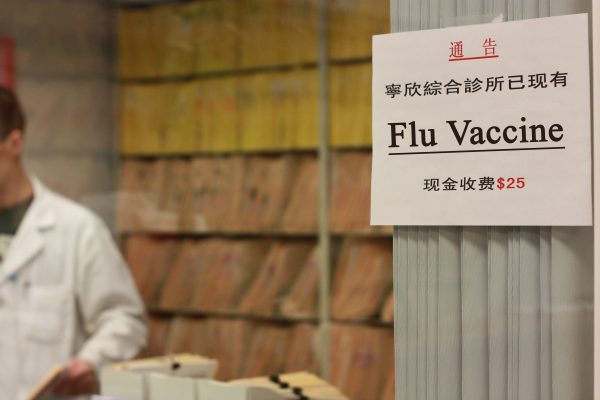Students Should Rely on Vaccines for Flu Prevention
Students can visit health services or a local clinic for the flu vaccine. (SHIRLEY HON/THE OBSERVER)
November 19, 2016
We all cherish the joys that come with fall: endless cups of hot cocoa, cozy sweaters and vibrant leaves in Central Park. Nonetheless, we despise fall’s evil twin: flu season. As flu season is underway, it is important to recognize the importance of staying healthy. Good health is the optimal way of living; people are able to go about their lives without the limitations of an illness. The flu, being highly contagious, hinders us from important commitments such as school, work and spending time with friends and family. Fortunately, there are a plethora of things that you can do to remain healthy through the severity of flu season, such as practicing good hygiene and maintaining a balanced diet. Above all, though, there is the flu shot, a praised injection that combats the flu virus.
The injection was first introduced in 1938, consisting of antibodies that develop in the body and protect against infection. Jennifer Huang, APN-BC, Nurse Practitioner at Health Services Lincoln Center, promoted the flu vaccine, “since the benefits outweigh any risk. [The] flu vaccine not only reduces the risk of contracting the flu, but it also reduces the severity of illness in those who are infected.” According to WebMD, influenza kills an average of 30,000 people each year. The flu shot will aid against the flu virus as well as many other respiratory illnesses, such as bronchitis or pertussis, and simply won’t hurt the immune system in any way. Undoubtedly, the vaccine is the best precaution during flu season.
Although the flu vaccine is recommended for almost everyone, Huang warned that, “those with severe, life-threatening allergies to egg proteins or any other components found in the flu vaccine, as well as individuals with Guillain-Barre Syndrome (GBS),” should steer clear. Otherwise, anyone is at risk of getting the flu. Huang even added that, “students living in communal halls are at increased risk of contracting the flu and should really consider coming [in] for their flu shots.” Basically, if you’re a McMahon or McKeon resident, you should plan a trip to Health Services, or any other medical office providing the flu vaccine.
She continued, “Anyone who has ever experienced flu-like symptoms such as fevers, chills, body aches, cough, sore throat, headaches, congestion or fatigue knows how awful it can be. The flu can also lead to more serious problems, such as pneumonia and even death.” Fortunately, both Lincoln Center and Rose Hill campuses offer flu vaccinations for a fee of $30. Considering the harsh symptoms and potential risks of the flu, the vaccine is worth every penny.
Many may doubt the effectiveness of the flu vaccination. Often, the following question is raised: does the flu vaccine make its recipients entirely immune to the flu? Let’s break down what the shot actually does for you. The vaccine’s efficiency varies from year to year, as do the viruses. It will work better if the viruses circulating that season match the administered vaccine. It also depends on the age and health of the individual vaccinated. Thus, the flu shot’s potency varies and does not protect against all viruses. Nevertheless, it is the best preventative measure against the flu.
Aside from receiving the flu shot, practicing good health decreases one’s chances of contracting the flu and other illnesses during flu season. Huang suggested good hand hygiene, adequate sleep, a healthy diet, vitamin C and zinc intake, avoiding alcohol and drugs, and minimizing stress to promote good health.









